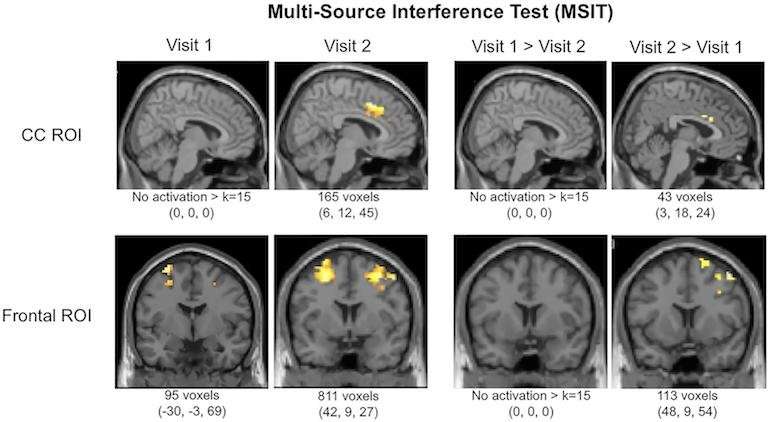A small study, based in Massachusetts, found that just three months of treatment with medical cannabis resulted in improved task performance and favorable brain activation that the researchers retrieved through MRI scans. Not only did patients experience improvements from their baseline three months before medical marijuana treatment; their brain activation patterns also more closely matched activation patterns in healthy control subjects. Further, the cannabis users cut their opioid and benzodiazepine use after the treatment.
The authors suggested that this demonstrated cannabis’s potential to restore brain function to levels that reflect ideal states of health in a process the researchers referred to as normalization.
This progression contrasts with research findings showing the opposite effect in recreational cannabis users — especially among younger individuals whose brains are still undergoing critical stages of development. The authors of the study could not conclude why medical marijuana patients experienced improvements in cognitive function and brain activation.
Heavy Cannabis Use Can Be Beneficial
They were able to rule out the frequency of use as a necessarily detrimental factor to cognitive health. Each of the 22 patients involved in the study was either new to marijuana or had not used it for at least two years before the investigation. But during the study, they used marijuana an average of five times per week and between once or twice a day, totaling ten uses per week through all means of consumption. This average rate of use typically describes “heavy use” in other cannabis studies.
It’s not the first study to associate heavy use with health benefits. A separate paper released last week suggested that heavy marijuana users who were abusers of alcohol experienced a significantly lower risk of several liver diseases — a 40 to 50 percent reduction in odds of being diagnosed with liver cancer, cirrhosis, hepatitis, and steatosis. Heavy users experienced lower risks of liver disease than even moderate users of cannabis. This reduction in incidence was likely due to marijuana’s anti-inflammatory effects.
For Health Benefits, Choose Your Strain Wisely
The cognitive differences may come down to which strain of cannabis a user is smoking. The authors of the study posited that while users take the same strain of marijuana both medically and recreationally, recreational users tend to seek out strains with a higher THC content to achieve a high.
In contrast, medical marijuana users tend to use strains that are notable for at least some CBD content, which has demonstrated protective properties against THC’s undesirable effects. The study cited evidence that acute administration of CBD before THC prevented cognitive detriments.
Other Secondary and Primary Benefits of Cannabis
In addition to cognitive benefits from medical marijuana use, patients of the MRI study reported improvements in quality of life, quality of sleep, and reduction in symptoms of depression. Perhaps more importantly, they documented improvements to the conditions that they had been looking to treat through cannabis, and some were even able to decrease their prescription medication use by the end of the study.
A majority of the patients involved in this study sought medical marijuana as a treatment for pain, while just shy of half used it to treat PTSD, anxiety, and sleep disruption. Their reports echo findings from other studies in which patients felt that marijuana alleviate symptoms of pain and inflammation more quickly, efficiently, and for more extended periods of time than conventional therapies.
Another recent report also suggested that medical marijuana use was beneficial for the brain, but specifically in the context of diseases with neurodegenerative components. The report found that cannabis improved symptoms suffered by patients with Parkinson’s as well as multiple sclerosis.

Minimalphilia on February 5th, 2018 at 18:47 UTC »
This is probably a stupid question, but neither the headline or article do answer it for me:
In patients with what exactly?
SirT6 on February 5th, 2018 at 16:26 UTC »
A couple of thoughts:
This article argues that patients taking medical marijuana have improved performance on certain cognitive task tests. This is the opposite of what is reported for people who take marijuana for recreational purposes.
The patient pool in this study is pretty hard to de-convolute. It enrolled patients taking medical marijuana for a range of indications, including mood disorder, anxiety, sleep deprivation, pain management and gastrointestinal issues. The paper as far as I could tell doesn't really attempt to unwind how these complicating factors may be affecting their results.
The study utilized a pre–post, within-subjects design in which all patients are MJ naïve at Visit 1 and are followed over the course of 12–24 months in order to clarify the impact of prolonged duration of exposure to MMJ treatment. I hate these types of studies. Essentially they are uncontrolled, and you never know what sort of placebo effects are in your system.
The study plans to do multiple follow ups. This is the first, three months after initiating marijuana usage. Let's see if it holds up over time.
slipknottin on February 5th, 2018 at 16:21 UTC »
I feel like the results are going to be screwy when the test subjects who are on opioids drop their opioid usage by 50% and those using benzos drop their usage by 50%.